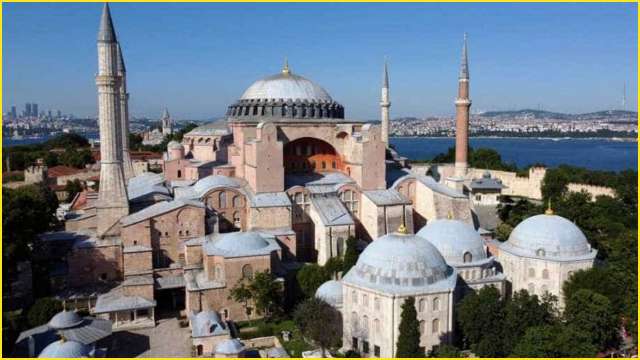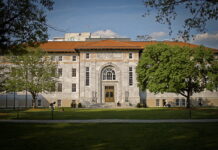Abraham Hadi siyasat.net
Three years ago, when I first set foot inside the main hall of Hagia Sofia, I was overcome by a number of emotions. Awe and astonishment gave way to a dull heartache, which I eventually realized arose from a grief that I, a Muslim, felt on behalf of my nearly 260 million orthodox Christian brethren. It was a wrong committed nearly six hundred years ago by none other than Sultan Mehmet Fatih, the celebrated conqueror of Constantinople, when he decided to convert the holiest site of Greek Orthodox Christianity, the Church of Hagia Sofia, into his imperial mosque. The unique vestiges of Byzantine iconoclasm that adorned the massive inner walls of the cathedral were plastered upon, all Christian symbols banished from within the walls, and on top of it were the orders to ‘Islamize’ the structure. The modern prayer hall still holds giant round murals with the name of the prophet Mohammad and his closest companions, along with massive marble water tanks for ablution. All of it seems a bit out of place, however, nothing more so than the Sultan’s personal prayer space, which is aligned at an uneasy angle from the nearest wall, giving an almost out-of-place feel to it.
Back then there were no talks of converting it into a mosque, and the debate regarding the designation of the structure had cooled down to nonexistence. Three years on, I find myself asking all the questions I believe I should have pondered upon a long time ago. I think it is very important to address the Turkish government’s recent decision not only on political grounds but more so on religious ones, for the verdict was presented wrapped in an aura of Islamic righteousness. It was Turkey’s (and evidently many Muslims’ around the world) Islamic pride that was addressed with the issue of this verdict, while the sense of right and wrong was squashed under the demagogic brilliance of the Turkish government.
For people supporting the move, it is merely a restoration of a mosque back to its original nature. The truth, however, lies nowhere near that argument. For many Muslims, including me, whose voices seem to fall on deaf ears, it was the first act of conversion back in the summer of 1453 that is illicit in its entirety. Ironically for a man who took the city in the name of Islam, Sultan Mehmet’s first action as a victor was in itself a clear violation of the Quran (40:22), which indicates it is unlawful to convert or harm any place where the name of God is chanted, be it a church or a synagogue. Throughout the early Islamic conquests, there has been a tradition of religious tolerance, respect, and preservation of prayer houses belonging to different religions. When caliph Umar accepted the surrender of Jerusalem and entered the city, he was invited by the bishop to say his Islamic prayers inside the church of Holy Sepulcher.
The caliph politely declined so as not to set a precedent and hence endanger the church’s status as a Christian site in the distant future. Sultan Mehmet II, who can have no better claim to piety than Umar, clearly did not learn by the latter’s example.
Another well-known account that can help us realize the illegitimacy of the cathedral’s conversion is the Ashtinameh of the prophet Mohammad, in which he granted protection to St. Catherine’s monastery (and subsequently all the followers of Jesus the Nazarene) in Sinai. Muslim armies would come and go, but no harm would ever be done to the monastery. It still stands as a Christian structure today, unlike the Hagia Sofia, in a country that is predominantly Muslim.
While reading about the issue over the past few days, many a time I came across people saying Sultan Mehmet’s move was fair because he bought the cathedral from its Christian owners, and then had it converted into a mosque. Little evidence exists of such a transaction, but even if we assume it to be factual, the argument still has some serious flaws. One has to keep in mind that the sultan entered the city of Constantinople a conqueror, and hence was the true holder of the entire city, without any regard to the approval of the ones being conquered.
It should also be kept in mind that the sultan himself entered the city after a complete three days of pillage and plunder by his troops, given the customs of that time. Hence I believe it is safe to say no-one would have sold one of the holiest of Christian sites out of a free will. It is historically noted that communities migrating because of the fear of religious persecution tend to sell off their possessions for as much as they can instead of abandoning them as freebies. The case of Hagia Sofia being sold and bought seems to be an example of the same.
For Turkey, this move also signifies a strong will to unapologetically step out and away from the cloak of secularism which has shrouded over it since the inception of the nation in its present form, something the Turks have previously prided themselves in. However popular a domestic move may it be for President Tayyib Erdogan, I am afraid its international implications will not favour the Muslims, especially those who live as minorities in the non-Muslim Balkan nations and have already been experiencing a sharp increase in Islamophobia and hate crimes. Turkey, as a nation itself may end up losing the strong ties it currently shares with Russia and Georgia, among many others, who happen to be predominantly eastern Orthodox Christian nations. Hence the more I think of it, the more bizarre the move starts to seem.
An opinion voiced recently held the verdict to be conscientious on political grounds, claiming it is Turkey’s reply to being belittled by the EU over the course of many decades. No injustice done to a person warrants another injustice in return, and as the Quran puts it (5:8) ‘do not let the hatred of people prevent you from being just’.
Thus it pitches Turkey’s national pride against the principles of Islam. The Ashtinameh of the Prophet against the decree of the Turkish court. Once this is realized, I believe the choice between the two would not be too ardous for the many Muslims celebrating the move, as well as for President Erdogan himself.
Inaugurating the cathedral as a mosque will also end up sowing the seeds of resentment in Christian hearts, and at a time where religious intolerance is at a high and brotherhood among different faith seems to be lost, it doesn’t seem to be the smartest of verdicts. For all, it should have been returned to the Eastern Orthodox Church as an act of goodwill.
The wrong which was committed so very long ago can still be rectified today, chasms between communities can still be mended, an inter-religious brotherhood still maintained. However, none of it is possible without bringing into consideration the many righteous Muslim voices, which in Orhan Pamuk’s words are simply ‘not heard’.(views are personal)
(www.siyasat.net is Ahmedabad,Gujarat,India based website)
(The author is an undergraduate student of politics at the Aligarh Muslim University.
He has written and spoken about contemporary Muslim issues such as Islamophobia, countering religious extremism, xenophobia etc. and has presented papers in summits regarding the same in Turkey, Sudan and India.)
































